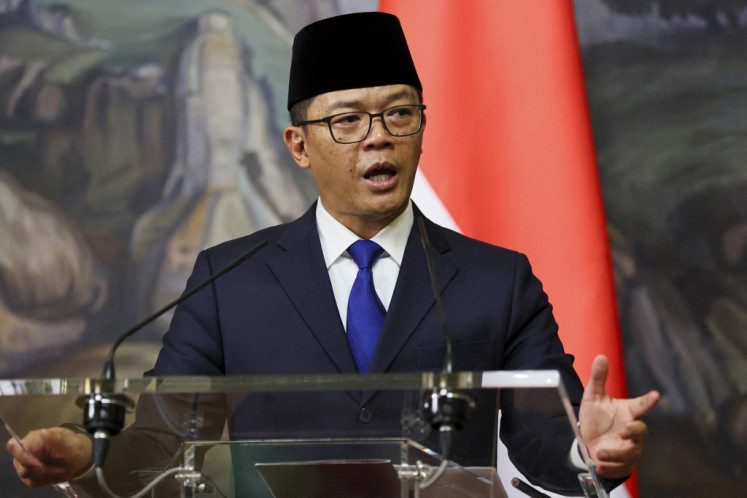Popular Reads
Top Results
Can't find what you're looking for?
View all search resultsPopular Reads
Top Results
Can't find what you're looking for?
View all search resultsCommentary: Managing coalition true test of Jokowi's presidency
Whatever coalition government president-elect Joko âJokowiâ Widodo cobbles together by the time of his inauguration on Oct
Change text size
Gift Premium Articles
to Anyone

W
hatever coalition government president-elect Joko 'Jokowi' Widodo cobbles together by the time of his inauguration on Oct. 20, it is not so much the size of the coalition as his own leadership and managerial skills that will determine the success of his presidency.
Jokowi needs to put together a coalition government to give him enough clout to be able to lead effectively, but there are indications that he may not be able to bring enough political parties around to his side to have a controlling majority in the House of Representatives.
He probably doesn't need to, if he plays his cards right.
Still, we could be in for a dysfunctional government. If Jokowi governs from a position of minority in the House, he will have to fight many policy battles with the opposition parties and faces the possibility of a legislative impasse.
Jokowi has already secured support from the Indonesian Democratic Party of Struggle (PDI-P), the National Democrat Party (Nasdem), the National Awakening Party (PKB) and the People's Conscience Party (Hanura), the parties that supported his presidential bid in July. They control 207 of the 560 seats in the House, 74 seats short of a controlling majority.
Jokowi is negotiating with other parties that had supported the other candidate, Prabowo Subianto, about the possibility of their joining his government. But with him being adamant about not giving away too many Cabinet seats, there is the possibility that he may not muster enough support.
Among prime candidates to join his coalition are the United Development Party (PPP), the National Mandate Party (PAN) and Golkar, the second largest party after the PDI-P.
Prabowo's own Gerindra and the Prosperous Justice Party (PKS) have vowed to oppose Jokowi in the House. The Democratic Party (PD) under outgoing President Susilo Bambang Yudhoyono (SBY) has refused to join either the new government or the opposition, preferring to play the role of a 'balancing factor'.
A president leading from a minority position is rare but not unheard of. Brazil, an equally large and politically fragmented nation, follows the presidential system, with the elected leader constantly having to put together a coalition government. Unlike a prime minister in a parliamentary system, a president with minority support does not face the prospect of a vote of no confidence that can bring down his government, but he does face the prospect of a legislative deadlock.
Jokowi has the unenviable task of being the first Indonesian president with little or no political base. All six of his predecessors led a political party.
Jokowi will count mostly on the support of the PDI-P, which is itself beset by factionalism. The party may have the most seats in the House, but it is too weak to fight the battles when the opposition parties gang up against it.
The PDI-P had a foretaste of how limited its power is when it lost the battle in the House last month over the new law on the composition of the House's leadership, which means that the PDI-P will not have an automatic right to the position of House speaker even though it has the most seats.
Another battle looms, again put together by the coalition of parties opposed to Jokowi, over a bill that will scrap local direct elections for governors, regency chiefs and mayors. The bill proposes that local leaders be elected by the legislative councils, as was the practice under President Soeharto. The PDI-P-led coalition is in the minority in opposing the initiative.
All this indicates that President Jokowi will face a hostile, combative and even vengeful opposition in the House. Some analysts predict that Jokowi may not last the whole five years.
Gerindra has secured the pledge of Golkar, the PKS, PAN and the PPP to continue their coalition arrangement beyond the presidential election, promising a formidable opposition block in the House to the new government under President Jokowi in October.
Managing Indonesia from a minority and weak position has never been more challenging.
Jokowi will have to strike a lot of bargains, cutting deals with different political factions inside and outside his coalition government. He may even be forced to make compromises, a practice he claimed to loath when he campaigned against 'transactional politics'.
He will also be counting on a little help from his friends. Former president Megawati, who chairs the PDI-P, and Jokowi's vice president Jusuf Kalla have experienced the intricacies of running a coalition government. Kalla proved to be an effective manager of the coalition government when he served as vice president to SBY in 2004-2009.
The opposition coalition may not be as solid as it is made out to be, and Jokowi may be able to drive a wedge through it and bring some of the parties to his side, if not as part of his coalition government then at least to support some of his policies once he takes the helm.
Jokowi has some experience in governing from a position of minority as Jakarta governor. He pushed through many of his policies, overcoming obstacles in the Jakarta legislative council by turning to public opinion. But the stakes are much higher at the national level and he cannot simply rely on public support to fight his battles with the opposition.
Whether or not Jokowi succeeds depends on how he uses his power and how he manages the coalition government. The nation has put its trust on him. Now, it's for him to show he has what it takes: statesmanship.
_____________
The writer is senior editor of The Jakarta Post.









